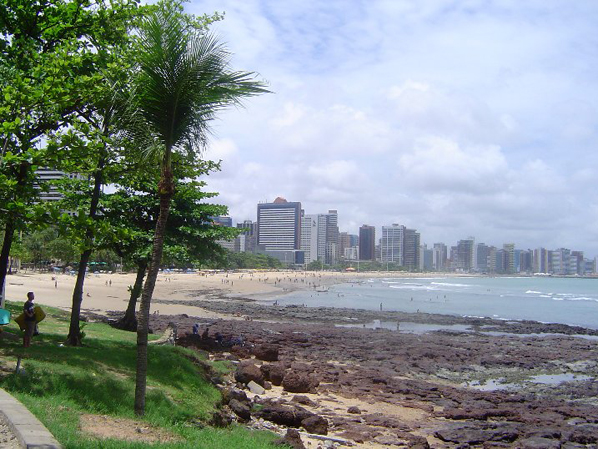FIFA World Cup 2014 Host City: Fortaleza
Although it was officially founded as a village in 1726, and would only become the capital of Ceará in 1799, Fortaleza (Portuguese for ‘fortress’) owes its name to the period between 1637 and 1654, when it was controlled by the Dutch, who built the Schoonenborch Fort.
Featuring 34 kilometres of wonderful beaches, Fortaleza has been one of the main tourist destinations in the north-east of Brazil for several years.
It has also developed into an important economic centre and a densely populated metropolitan area: over 2.4 million people reside within its 313 square kilometres.
Most of the tourist attractions in Fortaleza revolve around its beaches: the Praia do Futuro (Future Beach) popular for its several barracas - simple kiosk-restaurants built on the sand that serve fresh, typical seafood - while Iracema is the place for bars and nightclubs.

Views over the Fortaleza coast
There is also more bucolic Mucuripe Beach, from where fishermen venture into the sea with their jangadas (handmade wooden boats).
The coastal Beira Mar Avenue is also the place for a traditional daily craftsmen’s fair and for some of the top spots to dance the forró, a typical rhythm from the north-east of Brazil.
Over the decades, Fortaleza has invested in infra-structure for tourism and in new features such as the Centro Dragão do Mar de Arte e Cultura (Sea Dragon Art and Culture Centre) and the Beach Park, Brazil’s largest water park, with several cutting-edge speed-slides distributed along 35,000 square kilometres.
Football
Two of the most popular clubs from the north-east of Brazil come from Fortaleza: Ceará Sporting Club and Fortaleza Esporte Clube. Both teams have historically shared the attention of the fans throughout the whole state of Ceará, as well as the state titles.
The two sides have also played memorable roles in national competitions: Ceará were the runner-ups in the Copa do Brasil in 1994, when they lost to Grêmio, and they reached the semi finals in 2005, while Fortaleza finished runners-up twice in the Taça Brasil (a predecessor to the Campeonato Brasileiro), in 1960 and 1968.
The city of Fortaleza offers two main stadiums for the matches involving Ceará, Fortaleza and Ferroviário Esporte Clube: the 58,000-seater, state-owned Plácido Castelo, also known as the Castelão, and the city-owned Presidente Vargas. The former is set to be remodelled ahead of the 2014 FIFA World Cup.
Fast Facts
Name: Fortaleza
State: Ceará
Population: 2,505,552
Altitude: 21 m
Climate: Fortaleza has a typical tropical climate, specifically a tropical wet and dry climate, with high temperatures and high relative humidity throughout the year.
Professional Football Clubs: Ceará Sporting Club and Fortaleza Esporte Clube.

